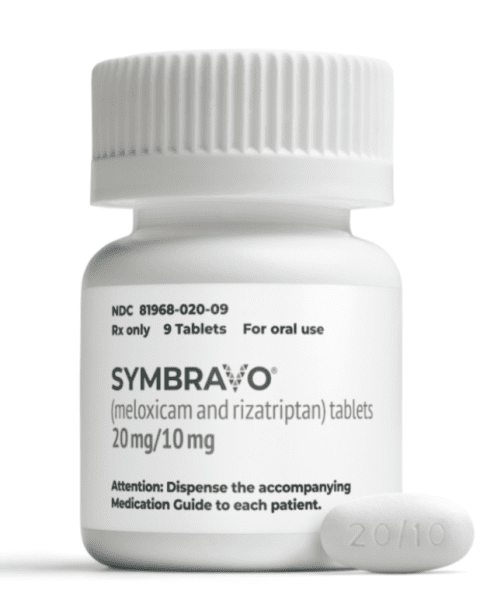Symbravo Interactions
There are 588 drugs known to interact with Symbravo (meloxicam/rizatriptan), along with 13 disease interactions, and 4 alcohol/food interactions. Of the total drug interactions, 172 are major, 328 are moderate, and 88 are minor.
- View all 588 medications that may interact with Symbravo
- View Symbravo alcohol/food interactions (4)
- View Symbravo disease interactions (13)
Most frequently checked interactions
View interaction reports for Symbravo (meloxicam / rizatriptan) and the medicines listed below.
- acetaminophen / hydrocodone
- Ajovy (fremanezumab)
- amphetamine / dextroamphetamine
- Atrovent HFA (ipratropium)
- Auvelity (bupropion / dextromethorphan)
- Azstarys (dexmethylphenidate / serdexmethylphenidate)
- baclofen
- Benefiber Powder (wheat dextrin)
- benzonatate
- beta glycans
- BuSpar (buspirone)
- calcium carbonate
- citalopram
- clonazepam
- cyanocobalamin
- Cymbalta (duloxetine)
- Dairy Digestant (lactase/rennet)
- Dayvigo (lemborexant)
- Depakote (divalproex sodium)
- diazepam
- dicyclomine
- diphenhydramine
- eletriptan
- Emgality (galcanezumab)
- escitalopram
- ferrous sulfate
- FIRST Mouthwash BLM (aluminum hydroxide / diphenhydramine / lidocaine / magnesium hydroxide / simethicone topical)
- Fish Oil (omega-3 polyunsaturated fatty acids)
- Florajen (lactobacillus acidophilus)
- fluconazole
Symbravo alcohol/food interactions
There are 4 alcohol/food interactions with Symbravo (meloxicam / rizatriptan).
Symbravo disease interactions
There are 13 disease interactions with Symbravo (meloxicam / rizatriptan) which include:
- CAD risk factors
- cardiovascular disease
- asthma
- fluid retention
- GI toxicity
- rash
- renal toxicities
- thrombosis
- anemia
- hepatotoxicity
- hyperkalemia
- platelet aggregation inhibition
- PKU
More about Symbravo (meloxicam / rizatriptan)
- Symbravo consumer information
- Compare alternatives
- Pricing & coupons
- Drug images
- Side effects
- Dosage information
- During pregnancy
- FDA approval history
- Drug class: antimigraine agents
- En español
Related treatment guides
Drug Interaction Classification
| Highly clinically significant. Avoid combinations; the risk of the interaction outweighs the benefit. | |
| Moderately clinically significant. Usually avoid combinations; use it only under special circumstances. | |
| Minimally clinically significant. Minimize risk; assess risk and consider an alternative drug, take steps to circumvent the interaction risk and/or institute a monitoring plan. | |
| No interaction information available. |
See also:
Further information
Always consult your healthcare provider to ensure the information displayed on this page applies to your personal circumstances.


